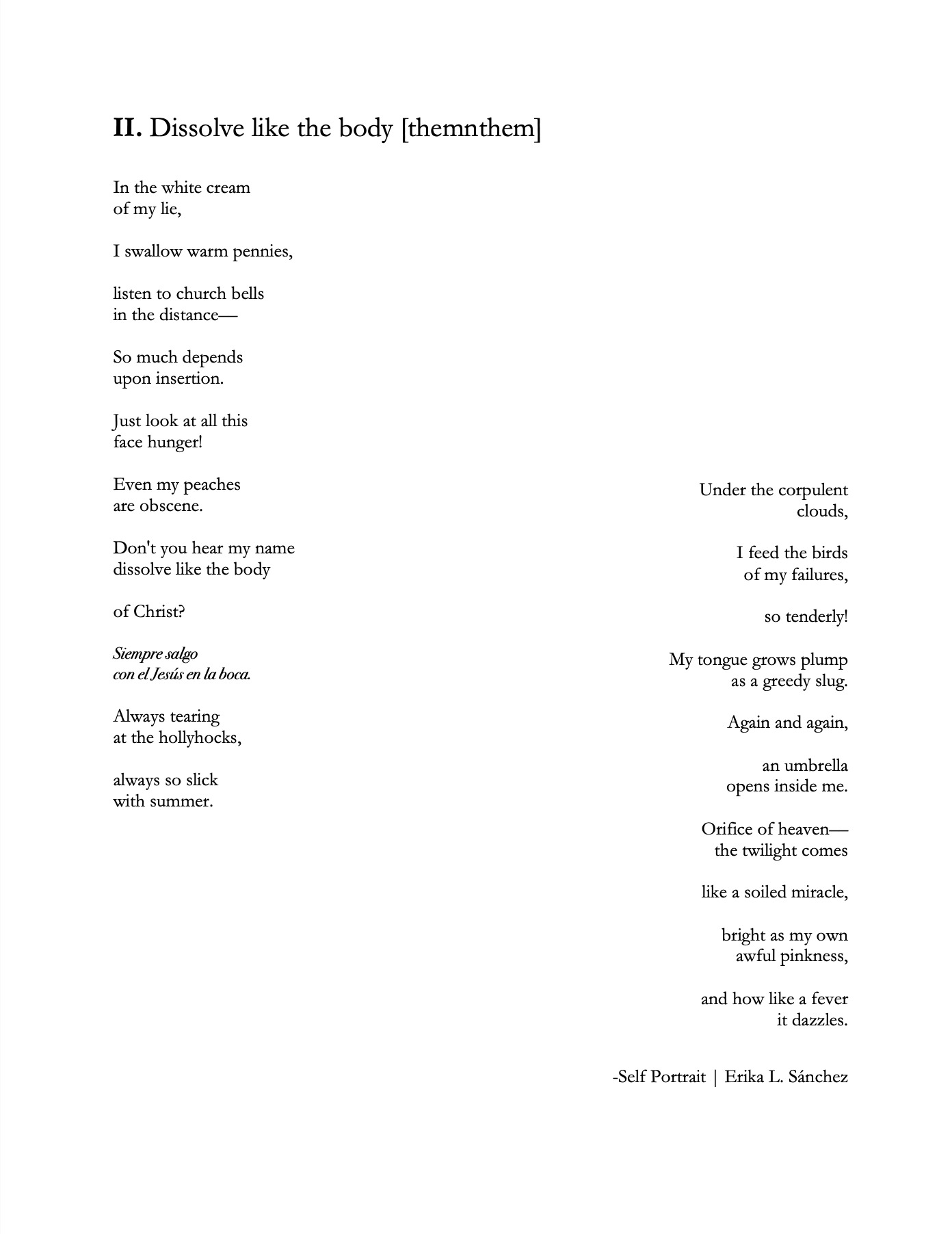 Image 1 of 6
Image 1 of 6

 Image 2 of 6
Image 2 of 6

 Image 3 of 6
Image 3 of 6

 Image 4 of 6
Image 4 of 6

 Image 5 of 6
Image 5 of 6

 Image 6 of 6
Image 6 of 6







Bright as my own - Tenor, Baritone, and Piano, Full Score (PDF Edition)
Ensemble: Tenor, Baritone, Piano
Duration: 11’
Commissioned: September 2022
Text: Sylvia Rivera, Christina Rossetti, Erika L. Sánchez, Michael Genese
Premiere: Nov 2, 2022, ChamberQUEER: Steven Wilson (Tenor), Brian Mummert (Baritone), Daniel Schlosberg (Piano), St. Paul’s Chapel at Trinity Wall Street, New York
Score comes in 8.5x11 PDF Format.
Ensemble: Tenor, Baritone, Piano
Duration: 11’
Commissioned: September 2022
Text: Sylvia Rivera, Christina Rossetti, Erika L. Sánchez, Michael Genese
Premiere: Nov 2, 2022, ChamberQUEER: Steven Wilson (Tenor), Brian Mummert (Baritone), Daniel Schlosberg (Piano), St. Paul’s Chapel at Trinity Wall Street, New York
Score comes in 8.5x11 PDF Format.
Ensemble: Tenor, Baritone, Piano
Duration: 11’
Commissioned: September 2022
Text: Sylvia Rivera, Christina Rossetti, Erika L. Sánchez, Michael Genese
Premiere: Nov 2, 2022, ChamberQUEER: Steven Wilson (Tenor), Brian Mummert (Baritone), Daniel Schlosberg (Piano), St. Paul’s Chapel at Trinity Wall Street, New York
Score comes in 8.5x11 PDF Format.
Program Note:
Concerning queerness as spirituality, intersectional liberation, and the scope of our liberatory organizing, Bright as my own opens with the song "Saintstaker [Sylvia and Christina]," where I place a communally oriented speech / explosion from Sylvia Rivera against a more individualistic and spiritually oriented poem, "Thread of Life" by Christina Rossetti. A calling out and roaring cry for intersectional liberation from Rivera is subverted again and again by status-quo-maintaining silence, disguised as preoccupation with a devotion to Christ. Rossetti's phrase "but who from thy self-chain shall set thee free?" is perhaps turned against her here, with the text's own self-chain calling to mind traditional and assimilatory gender ideologies of womanhood, and cishet white assimilation as the limit of queer struggle for liberation. At the same time, the usage of text from Sylvia Rivera presents another self-chain of sorts that the queer community risks encountering, in our contemporary revival of queer activists from the past. This is explained below by Eric Stanley:
In response to these historical and ongoing forms of degradation, which include the booming whiteness and gender normativity of what consolidates under the sign 'LGBT history,' Marsha [P. Johnson] and Sylvia have been revived as emblematic of a trans of color politic from Stonewall to the current moment. While important, this vital recovery performs a second-order displacement, by solidifying their identities, which were, in practice, constantly lived in beautiful inconsistency. Imposing a more current identity on a subject of history is part of the trouble––a trouble we can never avoid. [...] To this end, both their organized disappearance in LGBT history and their reemergence as an activist ideal extinguish their disruptive legacy. [They] ought to be brought into the collective archive, but if their appearance does not destabilize the mode of their arrival, then we have failed to do more than accommodate difference.
-Eric Stanley, Atmospheres of Violence (2021)
Thus in choosing the title "Saintstaker," it is my hope to metaphorically "stake" these self-chains presented in both texts as the violent inhibitors to liberation that they are: the modes of religion that kill for a homogenized, white, cisgender, heterosexual, monogamous existence, as well as the literal staking of Sylvia Rivera's present-day sainthood that extinguishes her authentic and disruptive legacy that was disliked, uncomfortable, and necessary.
The second song "Dissolve like the body [themnthem]" positions the singers as two voices within the same mind as they sing Erika L. Sánchez' "Self Portrait." The poem artfully positions the solitude that comes with self-discovery and queer awakening, alongside visions of church service and even conventional marriage. Religious allegory, sexual innuendo, and the learned-shame that comes with queer existence dissolve together in their own way here, as a queer form of spiritual practice and circumstance.
The piece ends with "Parameter [David and Jonathan]," using text I wrote after Chapter 18 of The Book of Samuel. Lightly inspired by Benjamin Britten’s interpretations of Abraham and Isaac, David and Jonathan––two biblical figures who are often speculated as lovers––are presented here to lend the mortal world advice: our history is full of latitudes and parameters that limit our discussion of queer existence in sacred and secular print, but the recognition of that existence cannot be the limit of how we define our freedom. Queer and trans people have been here since the beginning of time. David and Jonathan attempt to push us past useless wishing for recognition and assimilation, pleading us to demand more of the world we live in, similar to the ungovernable and disruptive nature of Sylvia Rivera's modes of activism. "Demand more. If not biblically, ungovernably, and learn your love."